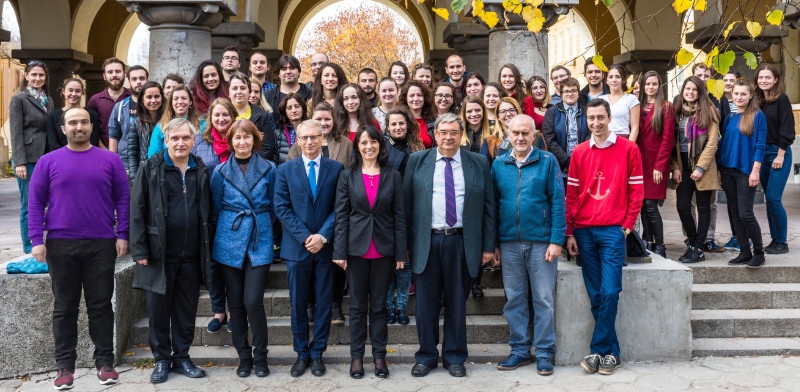|
Department of Chemical and Pharmaceutical Engineering |
News and Events: |
|||||
About Us:
The Department was founded in 1983, as part of the Faculty of Chemistry at the Sofia University. Initially, its name was "Laboratory of Thermodynamics and Physicochemical Hydrodynamics" (LTPH). In December 1999, it was renamed "Laboratory of Chemical Physics and Engineering" (LCPE). In May 2009, it was transformed into "Department of Chemical Engineering" (DCE). In May 2014, it was renamed "Department of Chemical and Pharmaceutical Engineering" (DCPE).
Heads of the unit have been Prof. I.B. Ivanov (1983-1993), Prof. P.A. Kralchevsky (1993-2008) and Prof. N.D. Denkov (2008-2015) and Prof. S. Tcholakova (2015-present).
At present, the DCPE has 8 people academic staff, including four full professors, two associate professors and two assistant professors. Among them, one is fellow of the Bulgarian Academy of Sciences (BAS), another one is corresponding member of BAS, three have DSc degree, and all of them have PhD. In addition, around 30 people (predominantly young researchers) are employed on industrial projects of DCPE, including 9 postdoctoral fellows, 13 PhD students and about 15 MSc and undergraduate students.
The research interests of DCPE are mainly in the area of disperse systems with applications in chemical, pharmaceutical and food industry. Fundamental and applied research is carried out in close cooperation with academic and industrial research centers in Europe (Austria, Belgium, France, Germany, Greece, Netherlands, Sweden, Switzerland, and UK), USA, Japan, India, Malaysia and Israel. Academic partners of DCPE have been the Cambridge University (UK); ETH Zürich (CH); Max Planck Institute for Polymer Research (Mainz, DE); CRPP-CNRS Bordeaux (FR); ESPCI-Paris (FR); University of Erlangen-Nürnberg (DE); Technical University of Graz (AT); Royal Institute of Technology (Stockholm, SE); University of Patras (GR); University of Hull (UK); NIPS Okazaki (Japan); Illinois Institute of Technology (Chicago, USA); Technion and The Hebrew University of Jerusalem (Israel), as well as R&D centers of the companies Unilever, BASF, Saint Gobain, Dow Corning, Kraft Foods, Colgate Palmolive, Krüss, KLK OLEO (Malaysia). At present, 18 research projects are led by the professors in DCPE.
The Department is well equipped with apparatuses and computer network for scientific research and training. In average, DCPE publishes 15 scientific papers per year in peer reviewed journals, presents over 30 lectures at international conferences (several of them plenary and invited) and 10-15 invited seminars in foreign institutes and universities. Professors of the department are among the most cited Bulgarian scientists: Prof. Peter Kralchevsky with over 6500 citations; Prof. Nikolai Denkov with over 5500 citations, and Prof. Krassimir Danov with over 3000 citations.
Apart from the work on projects, the staff is actively involved in teaching. In the period 1983 – 2010, the Laboratory taught mathematics and fluid mechanics courses for chemistry students, who specialize "Chemical physics and theoretical chemistry" later renamed "Physical and theoretical chemistry". In 1992 and 1995, the Laboratory has won two 3-year TEMPUS projects (funded by the European Union) for education of MSc students in co-operation with universities in France, Germany, the United Kingdom, Greece and Belgium. In 2008, the Department in co-operation with the Department of Applied Inorganic Chemistry founded the Bachelor program "Chemical Engineering and Advanced Materials". In 2012, the Department also founded the Master program "Disperse systems in chemical technologies".
Research - Publications by Area:
Research Fields of the Department (fundamental, and/or relevant to the industry):
Capillarity, Contact Angles, Thermodynamics of Liquid Films, Surface Forces
General Curved Interfaces, Bending Moments, Curvature Elastic Moduli
Oscillatory Structural Forces and Stratification of Liquid Films
Lateral Capillary Forces and Two-Dimensional Crystallization of Colloids
Static and Dynamic Surface Tension of Surfactant Solutions and Interfacial Rheology
Light Scattering from Dispersions and Electrokinetic Phenomena
Co-operation:
The research interests of DCPE are mainly in the area of disperse systems with applications in chemical, pharmaceutical and food industry. Fundamental and applied research is carried out in close cooperation with academic and industrial research centers in Europe (Austria, Belgium, France, Germany, Greece, Netherlands, Sweden, Switzerland, and UK), USA, Japan, India, Malaysia and Israel. Academic partners of DCPE have been the Cambridge University (UK); ETH Zürich (CH); Max Planck Institute for Polymer Research (Mainz, DE); CRPP-CNRS Bordeaux (FR); ESPCI-Paris (FR); University of Erlangen-Nürnberg (DE); Technical University of Graz (AT); Royal Institute of Technology (Stockholm, SE); University of Patras (GR); University of Hull (UK); NIPS Okazaki (Japan); Illinois Institute of Technology (Chicago, USA); Technion and The Hebrew University of Jerusalem (Israel), as well as R&D centers of the companies Unilever, BASF, Saint Gobain, Dow Corning, Kraft Foods, Colgate Palmolive, Krüss, KLK OLEO (Malaysia). At present, 18 research projects are led by the professors in DCPE.
At the average per year, the Department publishes about 15 scientific papers in international journals, accepts more than 10 foreign visitors, presents 15-20 papers at international conferences (several of them plenary and invited), and 10-15 invited seminars in foreign Institutes and Universities.

